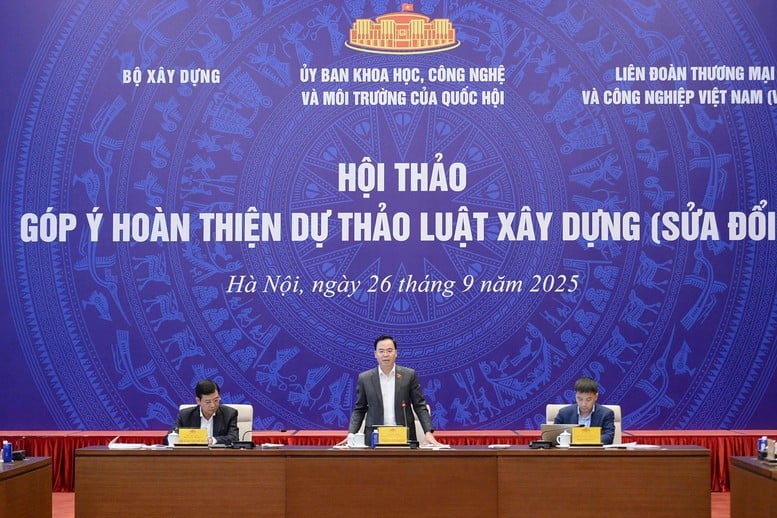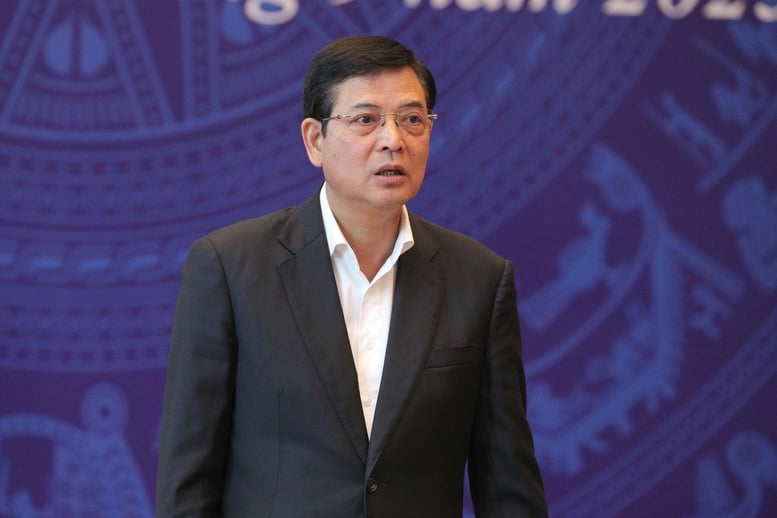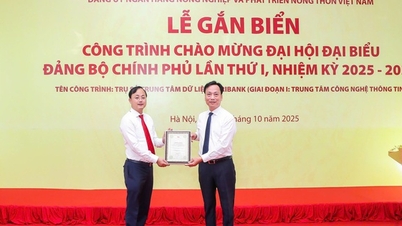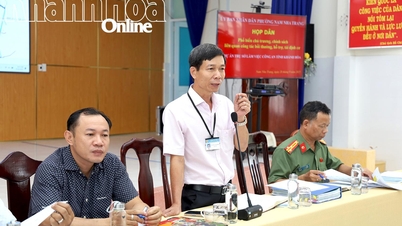
Vice Chairman of the Committee for Science , Technology and Environment Tran Van Khai delivered the opening speech. Photo: Construction Newspaper
On September 26, the Standing Committee of the National Assembly's Committee on Science, Technology and Environment (KH,CN&MT) coordinated with the Ministry of Construction and the Vietnam Federation of Commerce and Industry (VCCI) to organize a Workshop on Comments on Completing the Draft Law on Construction (amended).
According to the draft Law on Construction (amended), after receiving comments at the second session of the Government 's specialized meeting on law-making in September 2025, the draft Law on Construction (amended) was rearranged and restructured to include 8 Chapters and 97 Articles.
The latest draft amends the regulations on project classification to establish the contents of state management of construction according to each form of investment (public investment, PPP, business investment) to ensure no overlap in the scope of regulation and implementation order with the following laws: Law on Public Investment, Law on PPP, Law on Investment. In addition, there are a number of amendments to the regulations on project management forms; regulations on contract management...
In particular, the draft Law proposes to abolish 3 out of 8 groups of procedures compared to the current Construction Law such as appraisal of construction design implemented after basic design; granting certificates of construction activity capacity to organizations; recognizing socio-professional organizations qualified to grant certificates of construction activity capacity; abolishing all investment and business conditions in 10 conditional business lines and professions in the field of construction activities in the Investment Law.
For the remaining administrative procedures, the draft Law amends in the direction of reducing subjects and simplifying procedures, which are specified in detail in the Decree.
Without amending the law, growth targets cannot be achieved.
According to Vice Chairman of the Committee for Science, Technology and Environment Tran Van Khai, the Construction Law (amended) project is one of the important and practical law projects for people and businesses in the construction industry, contributing to removing bottlenecks to promote socio-economic development in the coming time, therefore, amending the Construction Law is an important task to achieve development goals.
He pointed out that administrative procedures are still complicated and have many layers, prolonging project implementation time and increasing costs for businesses. In addition, the lack of synchronization between laws causes confusion for investors and businesses. The current Construction Law from 2014 is outdated compared to the context of Industry 4.0 development, lacking incentives for the private sector and PPP projects; traditional appraisal and acceptance procedures increase costs and slow down progress. The application of new technologies such as BIM, GIS, and artificial intelligence in the construction sector is still slow, and there is no complete legal corridor.
In particular, the current state apparatus has changed with a two-tier government model, administrative units have been rearranged, and authority has been decentralized. This raises the issue that the Construction Law must be amended immediately. Otherwise, it will cause difficulties in project implementation at the local level.
"Recently, the National Assembly has approved the investment policy for many key projects. If these issues are not resolved promptly, the growth target cannot be achieved. Therefore, amending the Construction Law this time is a prerequisite," said Mr. Khai.
Switch from pre-control to post-control
Deputy Secretary General, Head of the Legal Department, Vietnam Chamber of Commerce and Industry (VCCI) Dau Anh Tuan assessed that this draft Construction Law has focused on shifting from pre-inspection to post-inspection, from strict management and detailed control to empowerment, responsibility and increased autonomy for entities. The draft law also clearly demonstrates the spirit of strongly cutting administrative procedures, simplifying investment, licensing, inspection and supervision processes, creating favorable conditions for production and business activities.
Associate Professor, Dr. Tran Chung, Chairman of the Vietnam Association of Road Traffic Construction Investors (VARSI), commented on the content of Chapter III of Construction Permits. In construction activities around the world, there are two most important types of permits: "Construction Permits" and "Construction Use Permits". Construction permits ensure compliance with discipline, while use permits respect the value of human rights to use safe construction works.
Therefore, Mr. Chung suggested that the guiding decrees after the Law is promulgated must have very in-depth research: types of constructions that must be licensed; conditions for licensing and licensing authority, transparency of content and procedures so that people and entities can conveniently comply with the law and publicly control.

Deputy Minister of Construction Bui Xuan Dung spoke to clarify and receive comments. Photo: Construction Newspaper
After listening to opinions at the workshop, Deputy Minister of Construction Bui Xuan Dung spoke to clarify and absorb the opinions.
Deputy Minister Bui Xuan Dung emphasized that the draft Law was built on the basis of fully absorbing the Central Resolutions, while closely following the direction of administrative procedure reform and improving the investment and business environment.
To innovate methods and improve the efficiency of construction investment management, the draft Law proposes to amend the classification of projects not according to capital sources as in the current Construction Law but according to investment forms (public investment, PPP, business investment).
Regarding project management forms, the current Construction Law stipulates four forms of project management (Specialized and regional project management boards, single-project project management boards, direct project management by investors, and project management consultants). However, to increase initiative and flexibility, in line with the reorganization of the central government apparatus and two-level local governments, the draft Law stipulates two forms: Construction investment management boards; Project management organization by investors.
The Draft Law has reduced and simplified administrative procedures and investment and business conditions. At the same time, it has added regulations allowing investment decision-makers to decide on the use of design types: basic design, FEED design; technical design in the Feasibility Study Report suitable to the nature and technical requirements of the project.
The appraisal content is simplified in the direction that the construction professional agency only controls construction safety, fire prevention and fighting, compliance with standards, conformity with planning, and other contents performed by the investor.
Regarding the design implemented after the basic design, the construction professional agency does not conduct appraisal of the construction design implemented after the basic design, but assigns the implementation to the investor. At the same time, enhance the role and responsibility of design consultants and appraisal consultants in professional contents.
Regarding construction permits, the draft Law stipulates that projects whose construction feasibility study reports have been appraised by specialized construction agencies are exempt from construction permits.
For the remaining projects, mainly small-scale projects, construction permits are issued (online) within a maximum of 7 days.
Affirming that the draft law will clearly define the responsibility of state management and the responsibility of the subjects participating in construction activities, Deputy Minister Bui Xuan Dung said that the draft will not stipulate the authority to carry out administrative procedures but will assign the Government to specify details in the direction of promoting thorough decentralization to local authorities; only retaining the central government for inter-provincial, inter-regional and inter-national issues; related to national defense, security, national sovereignty; with deep technical expertise or related to important national projects, key technology.
Phan Trang
Source: https://baochinhphu.vn/du-thao-luat-xay-dung-sua-doi-bai-bo-nhieu-thu-tuc-day-manh-phan-quyen-cho-dia-phuong-102250926222549532.htm



![[Photo] "Exposing letters" in the flood center of Lang Son](https://vphoto.vietnam.vn/thumb/1200x675/vietnam/resource/IMAGE/2025/10/10/1760080117518_ndo_br_z7101324112737-07cd4d1c01801a8ccf4ae0cbaf31c4a3-507-jpg.webp)

![[Photo] Unique Phu Gia horse hat weaving craft](https://vphoto.vietnam.vn/thumb/1200x675/vietnam/resource/IMAGE/2025/10/10/1760084018320_ndo_br_01-jpg.webp)

![[Photo] Ho Chi Minh City is brilliant with flags and flowers on the eve of the 1st Party Congress, term 2025-2030](https://vphoto.vietnam.vn/thumb/1200x675/vietnam/resource/IMAGE/2025/10/10/1760102923219_ndo_br_thiet-ke-chua-co-ten-43-png.webp)




















































































Comment (0)